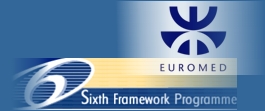

Project Objectives
The Euro-
Mediterranean Partnership (EMP) is clearly an ambitious effort to achieve better regional governance
through the development of an interlinked set of fundamental institutions in the Mediterranean
Basin.
The GO-EuroMed project’s specific target is to improve political and economic
understanding of these regional institution building and management strategies, particularly in the
key trade, investment and labour sectors. The project’s central theme – the ‘red line’ – is to bring
European and Mediterranean perspectives together in order to investigate ways in which
collaboration and coordination problems can be clarified and overcome. Institutional governance
frameworks offering real benefits to the states and peoples of Europe and the south Mediterranean
can be then be developed.
Project Goals and Methodological Approaches
The GO-EuroMed project has several scientific, policy, and dissemination goals which will be
addressed at different times over the duration of the project. Some of these goals relate to specific
issues that are addressed in individual Working Packages. Others are more open-ended, and will be
pursued throughout the project as a whole.
The fundamental issue of why the Barcelona Process has
achieved mixed results to date, and how it can be strengthened in its second decade, will lie behind
all research during the three years of the project. Similarly, the issues raised by shifting geographical
and mental ‘maps’ in the Mediterranean basin, and how these influence trans-Mediterranean
perspectives, will flavour ongoing dialogue and exchange between consortium members. The project
consortium, drawn from economics and political science institutes on both sides of the Mediterranean, is ideally balanced to provide unique insights into this sensitive area. Answers to
these questions will be delivered in the form of working papers and reports, and debated at
conferences and workshops, from month 1 to month 36.
Project Milestones
The GO-EuroMed project’s major milestones are its conferences and related publications, its
deliverable Working Package Reports, its annual management and scientific progress reports, its
workshops and its Public Awareness Local Meetings (PALMs).
Conferences will take place in Berlin, Istanbul, Cairo and Brussels. Scholars will present scientific
and policy papers, and these will be published as an edited volume in the month following each conference.
Six workshops, each consisting of one or more Working Package level meetings, will take place
during the 36 months duration of the project. These events will take place in Warsaw, Orléans,
Amman, Berlin, Tunis and Madrid. Each partner will hold two Public Awareness Local Meetings.
These events will take place in the member institute’s home city, will be conducted in local languages,
and will be a major dissemination vehicle for the project’s results.
Measures of Success
The GO-EuroMed project will measure success in four ways: scientific output, policy findings,
deeper trans-Mediterranean research cooperation, and dissemination among and beyond the research
community.
The project’s policy findings will improve the knowledge base available to policymakers on both
sides of the Mediterranean Sea. Reports will be submitted to the European Commission, and may in
some cases be made available to interested parties at national and local levels in individual states. The
extent to whether the project influences national and Community policy directly will be determined
by policymakers themselves – however, it is expected that GO-EuroMed’s policy relevance is such
that the project’s findings will attract the attention of policymakers throughout the region.
|

